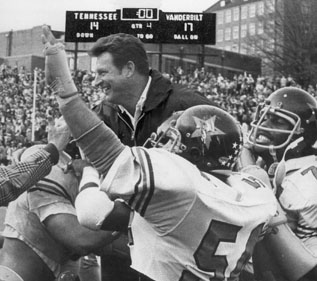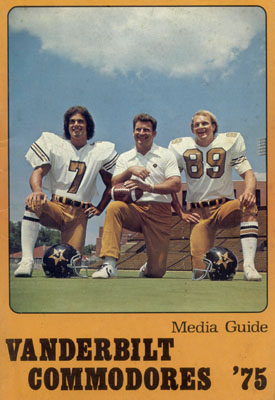Aug. 31, 2011
Commodore History Corner Archive
Editor’s Note: Nashville sports historian Bill Traughber has enlightened Vanderbilt fans over the years with his thoughtful essays on Commodore history. The award-winning author has recently written another book, Vanderbilt Football: Tales of Commodore Gridiron History. The 160-page paperback book includes 55 photos and can be preordered on historypress.net for $19.99. It will be in Nashville area bookstores the week of September 5.
 Former Vanderbilt head football coach Fred Pancoast (1975-79) was raised in Pensacola, Florida, and graduated from Pensacola High School (1949) where he is a member of its Sports Hall of Fame. The quarterback went on to play his college football at the University of Tampa where he lettered all four years in football and baseball.
Former Vanderbilt head football coach Fred Pancoast (1975-79) was raised in Pensacola, Florida, and graduated from Pensacola High School (1949) where he is a member of its Sports Hall of Fame. The quarterback went on to play his college football at the University of Tampa where he lettered all four years in football and baseball.
“I was being recruited by Florida State, but Tampa offered to do more for me,” Pancoast said recently from his Nashville office. “At that time, Tampa gave more scholarships than FSU. They offered me a summer job where I could stay there in the dorm that they provided me. I didn’t have anything. That made the difference.
“I made the Florida college all-State team, which included Florida State, Florida and Miami. I was a second-team quarterback and started as a safety and was all-State every year as a defensive back. We played some big schools like Southern Mississippi, Florida State, Ole Miss and Tennessee. We were a small college that played a big schedule. I had a scholarship offer to play at Navy for my last year, but I couldn’t pass the physical.”
After leaving Tampa, Pancoast served in the U.S. Marine Corps in Recruit Training where he played both football and baseball on the service teams. He was an all-Service quarterback while serving in Paris Island. After his military service, Pancoast was a teacher and coach at Hillsboro High School in Tampa.
After one year at Hillsboro, Pancoast became an assistant football coach at Tampa. When the head football coach left the next year, Pancoast was named as his replacement. In his two seasons in Tampa (1962-63), Pancoast was 7-9-3. Pancoast found an opportunity to join the coaching ranks of the Southeastern Conference when he was asked to become an assistant coach and offensive coordinator for Coach Ray Graves in Florida.
“You had your big games at Florida,” said Pancoast. “We played Florida State and Miami that were just bigger than the conference competition. We played all the teams in the SEC, but Miami and Florida State were the big ones since they were in state. Then we got into an arrangement where we played Tennessee. In my last year at Florida we played them in the Gator Bowl. Tennessee had one loss and won the conference championship. We beat them and won the Gator Bowl. This is with John Reaves and Carlos Alvarez. Alvarez was one of the great receivers we had at Florida.”
In 1966, Pancoast was the Gators’ quarterback coach for Heisman Trophy winner Steve Spurrier. That year the Gators were 9-2 with an Orange Bowl victory over Georgia Tech.
“He [Spurrier] made me a better and much smarter coach,” said Pancoast. “I hit it just right where I coached him as a junior and senior. Of course, he won the Heisman Trophy his senior year and I got some credit for that. I didn’t deserve that much credit since he was such a great athlete. But we put him in the right place at the right time and won a lot of games.
“When Spurrier left, everybody thought that we had lost everything. We had planned far ahead to be able to prepare ourselves to recruit Reaves as the next Spurrier. We finally signed him two years after Spurrier graduated. We opened the 1969 with Reaves as our sophomore quarterback against Houston. At that time Houston was one of the top teams in the country. We held Reaves back from the spring game to hide them. We beat them by three touchdowns. Then we went on to have that great year and beat Tennessee in the Gator Bowl.
“When my wife and I were driving home from the Gator Bowl we rode by the Ramada Inn in Gainesville and read a sign, `Welcome Home, Doug Dickey.’ We had been lied to. I hate to say that, but we were told those rumors of Dickey leaving Tennessee for Florida were not true. That was in the media everywhere that Doug Dickey was going back to Florida.
“When Graves resigned, it left all of us hanging. When I got back to Gainesville, I got a hold of Vince Dooley. Vince and I played against each other in high school and played together in service ball. He had already offered me the offensive coordinator’s job in Georgia. I immediately took that. I did not want to work at Florida under Doug Dickey. He had a different offensive mind and everything.”
While coaching for Florida and Georgia, Pancoast would face Vanderbilt each year. He said that Vanderbilt never had the material as the other SEC schools and could not hold up physically. Pancoast and the other coaches looked on the schedule and counted Vanderbilt as a victory each year.
Pancoast was at Georgia for two seasons (1970-71) before he became the head coach at Memphis State.
“One year at Georgia, we had won big and beat [Georgia] Tech in a big nationally-televised game,” said Pancoast. “We had a great year and all of a sudden they started calling me about the Memphis State job. We had a quarterback at Georgia named Andy Johnson that was very good, but not much of a thrower. My offense was a passing offense. We still had a great year. He learned and became better and better.
“Bill Kinard, who was the coach at Ole Miss and coached with me at Florida, convinced me that that job [Memphis State] was going to be one of the great jobs in the country. And they had put so much money into the program and had many good players. I was at the age where I was ready for a head coaching job so I took it.”
Pancoast was head coach at Memphis State for three seasons (1972-74) with an overall record of 15-12-1.
“The first year, we didn’t have much and struggled,” said Pancoast. “We won six games and started to recruit better. We beat Ole Miss two out of three years, which was the big rivalry. And we beat Florida State. We won some big games and were getting better and better every year. They were at the bottom when I took over. We gradually worked our way up to where we were a very respectable football team.”
In 1974, Vanderbilt was coming off a 7-3-2 year with a 6-6 season-ending tie in the Peach Bowl with Texas Tech. Vanderbilt’s head coach was Steve Sloan and surprised Nashville when he bolted for Lubbock, Texas to become the Red Raiders coach shortly after the bowl game. Sloan was a very popular and youthful coach at Vanderbilt.
“They [Vanderbilt] contacted me over and over,” said Pancoast. “Fred Russell [Nashville Banner sports writer] took the lead there and also Dr. Boyd McWhorter, who was the SEC Commissioner. He was a close friend of mine from Georgia and actually talked me into taking the job. He felt that Vanderbilt was going to start winning and I’d be back in the conference. But, there I was sitting with a great team coming back at Memphis. I have to say I made my first big mistake by leaving Memphis.
“I didn’t get along very well with the AD in Memphis because he was the coach that they fired. He’d been coaching there for years and I took his place. He didn’t like me and he was my boss. Gene Bartow was the basketball coach and the AD didn’t like either one of us. Bartow lost in the finals of the national championship game (1973-74) in basketball and I was beating Ole Miss in football. He didn’t like it and gave me a hard time.”
 Pancoast’s first Commodore squad (1975) finished the season at 7-4 (SEC, 2-4) winning the last four in a row. The final game was a 17-14 victory over Tennessee in Knoxville.
Pancoast’s first Commodore squad (1975) finished the season at 7-4 (SEC, 2-4) winning the last four in a row. The final game was a 17-14 victory over Tennessee in Knoxville.
“We had a lot of seniors with Bill Pace and Steve Sloan recruits,” Pancoast said. “We had some good players. They played well together. [Paul] Bear Bryant told me after the season was over if he’d known that I was going to win the last four games, he would have voted for me as Coach of the Year.
“At Tennessee, they had a big deal with Barry Burton the year before who was the [Vanderbilt] punter that cost them the game when he fumbled the snap deep in Vandy’s territory that led to a Tennessee touchdown. Near the end of our game Burton was punting and the whole stadium was yelling “punt, Barry, punt.’ He punted one of the longest balls he’d ever hit. It was 65 yards. It put them inside their five-yard line and we held them and scored the winning touchdown. My son-in-law actually kicked the winning field goal. One of my daughters was a cheerleader that married Mark (Adams).”
The 1976 season opened with a national power in No. 5 ranked Oklahoma visiting the Vanderbilt campus. Though Vanderbilt lost the game 24-3, it was 14-3 at halftime.
“We were totally rebuilding and playing a lot of close games that season,” said Pancoast. “We led LSU 20-0 and lost. We just didn’t have any depth. Back then Vanderbilt was playing the heart of the conference. We had to play so many conference games. And our athletic director was basically told to make money.
“So he would line up the best teams in the country to come to Nashville and play us. I was getting killed. The year after we beat Tennessee we actually played Tennessee in Nashville and lost by a field goal. We missed three field goals inside the 20-yard line. We should have beaten them two in a row.”
Vanderbilt finished the season 2-9 (SEC, 0-6) with wins over Wake Forest and Air Force. The 1977 season would begin again with Oklahoma in Norman. This time the Sooners were ranked No. 1 in the early season. Vanderbilt lost 25-23, but not without controversy.
“We outplayed them from the beginning for the entire game,” Pancoast said. “In the first series they fumbled the ball in the end zone and we recovered. The officials called a meeting–they were split officials. We fell on the ball and they gave it to Oklahoma. We went on to play toe-to-toe the rest of the way. The controversial play was when we were down by two points in the fourth quarter. They started a drive and got down to about our 30-yard line.
“It was fourth and about three for them to keep the ball. They ran the ball on fourth down and didn’t make it. The officials ruled it was our ball. Our offense went in and their defense went in. Barry Switzer [Sooners head coach] came on the field and asked the officials to remeasure the ball. This is after they had moved the ball to the hash mark. They had already measured it once. They said they made it by an inch. Somebody on the sideline told me later that the official moved the stick just enough to touch the ball. If we had the ball, we could have won with a field goal.”
The Commodores concluded that season once again at 2-9 (SEC, 0-6). Victories were recorded over Air Force and Cincinnati. In 1978, Pancoast would experience a high and a low as the Vanderbilt coach. Commodore running back, Frank Mordica, broke loose for an SEC rushing record of 321 yards (22 carries) against Air Force. That record has since been tied by Arkansas’ Darren McFadden (34 carries) in 2007.
“The coach at Air Force was Bill Parcells, a one-time assistant at Vanderbilt,” said Pancoast. “We had Frank Mordica, who we stole from Florida. He was a great running back. He was four yards away from breaking the national rushing record in that game. I took him out of the game knowing he was that close to the record. I did not want to embarrass Parcells. I knew he was going to have a good coaching career so I didn’t see any reason to embarrass him. We won the game [41-27] and that was what we wanted.”
Also in 1978, Pancoast would return to the Liberty Bowl to face his old team Memphis State. The Tigers won, 35-14.
“That just about put me out of it,” said Pancoast. “I was already told I was going to be let go. Losing that game was probably the low point of my career. It wasn’t made public that I was not returning. It was not easy to function as the coach knowing I only had a few games left and couldn’t talk about it. You just have to find out how tough you are. The players can’t know that and you have to keep them going. It was just a rough time. You hate to have to go out that way in your career. It was not very pleasant.”
The Commodores would record their third straight 2-9 (SEC, 0-6) seasons and George MacIntyre would succeed Pancoast. Pancoast was asked about recruiting to Vanderbilt with the conditions he was working with.
“You are playing in the strongest conference in the country, and you have to play at least six to seven conference games each year,” said Pancoast. “You bring a kid in and you have horrible facilities and then you look at his grades and he has to be a Harvard-type student. It was just very difficult. It was a very simple thing. It was an academic school in the toughest conference in the country. Once you line up on the field, no one pays attention to that.”
The 1978 season would be the final for Pancoast as a football coach.
“That last year did me in,” said Pancoast. “Having to keep those boys going under those circumstances was just all I could take. I got two or three calls for offensive coordinators jobs; one of them was at Auburn. A good friend was on the Vanderbilt Board of Trust and he owned Murray Manufacturing Company. He would put me in a top job to head up human resources and pay me more than I was making coaching. So I took it and left.”
After leaving Vanderbilt, Pancoast did join Murray Manufacturing Company to become director of human resources at an organization of over 4,000 employees. Pancoast founded Pancoast Benefits in 1985 to provide employee benefit consulting and administration for employees nationwide.
Pancoast is active in charitable organizations such as Operation Stand Down Nashville, Room in the Inn and numerous other civic activities. In 2007, the Tennessee Sports Hall of Fame gave Pancoast the Lifetime Achievement Award. In 2008, President George W. Bush greeted Pancoast upon his arrival at the Nashville airport for an event. President Bush honored him with the President’s Volunteer Service Award.
Pancoast’s four-year record at Vanderbilt was 13-31. He was asked if there was a favorite moment coaching the Commodores.
“In my last year we played the opening game in Arkansas at Little Rock,” said Pancoast. “They were ranked No. 2 in the country and we lost to them [48-17]. But we never gave up. Lou Holtz wrote me and the team a letter after the game saying that was the greatest effort he had ever seen on a football field. What Lou Holtz did I thought was unheard for a coach from a major school to write you a letter and say to read it to your entire team. That the game we lost was the greatest effort he’d ever seen on a football field. That kind of thing meant a lot to me. I still have that letter framed and hanging in my office. Of all the awards I’ve ever gotten, that stands at the top.”
For any comments or suggestions you can contact Bill Traughber via email at WLTraughber@aol.com.



